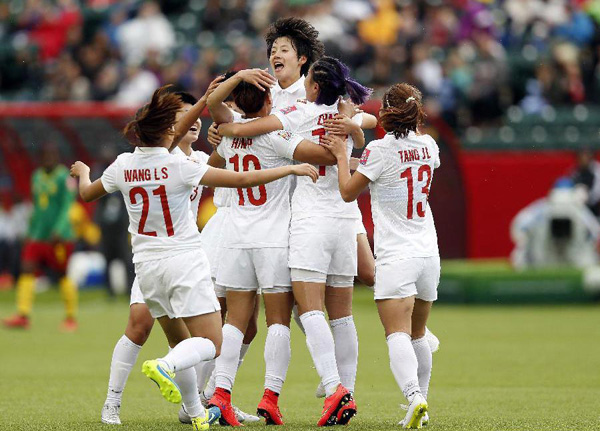 |
|
China's players celebrate a goal during a round of 16 match between China and Cameroon at the Commonwealth Stadium in Edmonton, Canada, on June 20, 2015. [Photo/Xinhua] |
For soccer fans long starved for winning results, China's 1-0 win over Cameroon on Saturday greatly enhanced the celebratory mood of Dragon Boat Festival. The victory earned the team a quarterfinal berth at the prestigious tournament in Canada.
"No matter how far they go, these women deserve applause for their dedication, persistence and hard work during a tough time for the game in China," Shen Fangjiang, a China Central Television commentator, said after the game.
The result marked the first time the squad had returned to quarterfinals at the World Cup since 1999, offering a boost to the country's ambitious plan for improving the game's level from the grassroots to elite level.
"The women's team experienced a low period, as the men's counterpart did in the past decade. And we are still struggling uphill to return to full strength," Yu Hongchen, vice-president of the Chinese Football Association, said after the game.
"Today's result reflects that the entire system behind the women's national team-including youth recruitment, elite training and logistical support-h(huán)as been improved as the central government's soccer-boosting plan envisioned. It inspires greater participation game at the grassroots level. But we still lag behind the world's elites, and we have a lot of work to do."
Thanks to President Xi Jinping's focus on soccer, a comprehensive reform and development plan involving women and youth was approved by the State Council in February, with high expectations of overhauling the game's management system and improving youth training.
The reforms will delink the semi-administrative CFA from the General Administration of Sport of China, which is now managing the association with its own officials, and make the association a full-fledged nongovernmental organization.
Because of concentrated power and lack of supervision, the soccer pitch became a breeding ground for corruption in the early 2000s, which saw 59 officials, referees and club owners, including former CFA chief Xie Yalong, jailed.
The image of the game was badly tarnished by the scandal, and grassroots participation in both men's and women's soccer suffered a decline.
Led by female veterans dubbed "the steel roses"-including former FIFA Female Player of the Century Sun Wen-the Chinese team was a world-class power in the 1990s. It finished second at the 1996 Atlanta Olympics and at the 1999 World Cup in the United States.
Retirements of the golden generation and the thin reserve talent pool, hampered by the management scandals, saw the national teams struggle to regain the world stage in recent years, highlighted by the elimination from the World Cup in 2011.
Wen Lirong, who played on the 1999 World Cup team, applauded the current team and said games should be better promoted nationwide.
"Women's soccer has a unique beauty-athleticism combined with feminine charm. I believe with more media coverage the World Cup performance will attract more fans and inspire more young women to play," said Wen, who now works for the CFA.
To reward the team's success, the CFA has created the largest-ever pool of prize money in women's soccer history. It will provide additional bonuses through sponsorship funds once the team advances to the semifinals, Yu said.